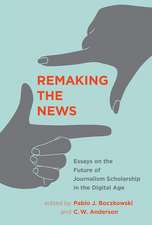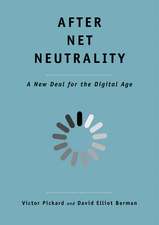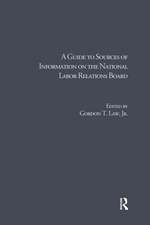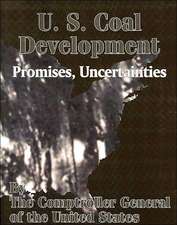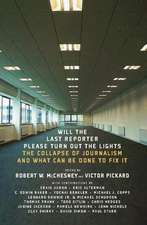America's Battle for Media Democracy: The Triumph of Corporate Libertarianism and the Future of Media Reform: Communication, Society and Politics
Autor Victor Pickarden Limba Engleză Paperback – 26 oct 2014
| Toate formatele și edițiile | Preț | Express |
|---|---|---|
| Paperback (1) | 222.33 lei 6-8 săpt. | |
| Cambridge University Press – 26 oct 2014 | 222.33 lei 6-8 săpt. | |
| Hardback (1) | 553.28 lei 6-8 săpt. | |
| Cambridge University Press – 26 oct 2014 | 553.28 lei 6-8 săpt. |
Din seria Communication, Society and Politics
-
 Preț: 192.21 lei
Preț: 192.21 lei -
 Preț: 188.94 lei
Preț: 188.94 lei -
 Preț: 207.35 lei
Preț: 207.35 lei -
 Preț: 227.23 lei
Preț: 227.23 lei -
 Preț: 204.48 lei
Preț: 204.48 lei -
 Preț: 388.16 lei
Preț: 388.16 lei - 11%
 Preț: 568.81 lei
Preț: 568.81 lei -
 Preț: 173.02 lei
Preț: 173.02 lei -
 Preț: 204.56 lei
Preț: 204.56 lei -
 Preț: 230.51 lei
Preț: 230.51 lei -
 Preț: 209.78 lei
Preț: 209.78 lei -
 Preț: 267.61 lei
Preț: 267.61 lei -
 Preț: 269.58 lei
Preț: 269.58 lei -
 Preț: 269.19 lei
Preț: 269.19 lei -
 Preț: 203.50 lei
Preț: 203.50 lei -
 Preț: 229.74 lei
Preț: 229.74 lei -
 Preț: 206.29 lei
Preț: 206.29 lei -
 Preț: 266.47 lei
Preț: 266.47 lei -
 Preț: 273.89 lei
Preț: 273.89 lei -
 Preț: 326.70 lei
Preț: 326.70 lei -
 Preț: 252.03 lei
Preț: 252.03 lei -
 Preț: 289.01 lei
Preț: 289.01 lei -
 Preț: 267.61 lei
Preț: 267.61 lei -
 Preț: 226.68 lei
Preț: 226.68 lei - 11%
 Preț: 558.08 lei
Preț: 558.08 lei -
 Preț: 265.70 lei
Preț: 265.70 lei -
 Preț: 288.04 lei
Preț: 288.04 lei -
 Preț: 313.10 lei
Preț: 313.10 lei - 11%
 Preț: 646.80 lei
Preț: 646.80 lei
Preț: 222.33 lei
Nou
Puncte Express: 333
Preț estimativ în valută:
42.54€ • 44.54$ • 35.20£
42.54€ • 44.54$ • 35.20£
Carte tipărită la comandă
Livrare economică 05-19 aprilie
Preluare comenzi: 021 569.72.76
Specificații
ISBN-13: 9781107694750
ISBN-10: 1107694752
Pagini: 262
Ilustrații: black & white illustrations
Dimensiuni: 152 x 226 x 25 mm
Greutate: 0.36 kg
Editura: Cambridge University Press
Colecția Cambridge University Press
Seria Communication, Society and Politics
Locul publicării:New York, United States
ISBN-10: 1107694752
Pagini: 262
Ilustrații: black & white illustrations
Dimensiuni: 152 x 226 x 25 mm
Greutate: 0.36 kg
Editura: Cambridge University Press
Colecția Cambridge University Press
Seria Communication, Society and Politics
Locul publicării:New York, United States
Cuprins
Introduction: the policy origins and normative foundations of American media; 1. The revolt against radio; 2. A progressive turn at the FCC; 3. The battle of the Blue Book; 4. The origins of the Fairness Doctrine; 5. The 1940s newspaper crisis and the birth of the Hutchins Commission; 6. Should the giants be slain or persuaded to be good?; 7. The postwar settlement for American media; Conclusion: confronting market failure.
Recenzii
'Today's media didn't have to be so bad. Pickard tells a riveting and heretofore largely unknown story of how corporate media had its way with the public interest and trivialized our country's civic dialogue, despite the efforts of reformers and a once-heroic FCC. Bringing the story right up to today's high-stakes battle for an Open Internet, this is 'must-must' reading for anyone interested in putting our democracy back on track.' Hon. Michael J. Copps, FCC Commissioner, 2001–12
'America's Battle for Media Democracy is a well-researched, thoughtful, and lucid critique of media policy in the contemporary United States. To make his case, Pickard turns to history. During the 1940s, media activists joined together with government officials, academics, and even some corporate leaders to articulate an expansive, social democratic vision for newspapers and radio. The defeat of this movement hastened the triumph of corporate libertarianism - a tradition whose origin Pickard provocatively traces not to the free market fundamentalism of the recent past, but, rather, to the political settlement that followed the Second World War.' Richard R. John, Columbia University, New York
'In America's Battle for Media Democracy, Victor Pickard has produced a landmark work in communication history and media studies. Based on painstaking research, [he] sheds crucial new light on the political debates that created the contemporary commercial media system in the United States, and by doing so he allows us to envision a different and better future. This is mandatory reading for everyone concerned with media and politics.' Robert W. McChesney, University of Illinois, Urbana-Champaign
'Victor Pickard is a scholar on the rise. His writing is fine and to the point. There is always need for solid media history based on primary research and good analysis - and this book fulfills both.' Christopher Sterling, George Washington University, Washington DC
'America's Battle for Media Democracy is a wonderful contribution. Very illuminating - and poignant, but with rays of hope. A really fine piece of work.' Noam Chomsky, Massachusetts Institute of Technology
'Victor Pickard has written a definitive book that shows how corporations took over the media, and how the public lost control of the airwaves to commercialism in the '30s and '40s. America's Battle for Media Democracy goes deeply into the history when liberals had a pulse and there was, at least, a controversy. I must admire the luck that students have to learn from Professor Pickard to open their eyes and generate independent thinking about these important issues.' Ralph Nader
'In this fascinating history, Pickard gets to the deep roots of the modern media consolidation mess we're in - not a state of nature, but the result of choices. It's a vital, powerful book.' Zephyr Teachout, Fordham University, New York
'My frustration with contemporary news media - especially as it covers fundamental questions of war and peace, inequality and the survival of the planet - is rooted in an understanding that it could be so much better. No one has done a finer job of exploring the moments at which wrong turns were taken than Victor Pickard. He identifies the critical junctures, explores the forces that were in play and describes the consequences of wrong choices and wrong policies. As we read Pickard, we recognize what has been lost. But, far more importantly, we recognize what is still possible. America's Battle for Media Democracy provides a foundation of history and insight. With it, we can begin to build new and better media - and the genuine democracy that flourishes when people have the information they need to be their own governors.' John Nichols, The Nation
'The roots of today's conglomerized media system can be traced back to battles for media democracy fought, and lost, decades ago. Victor Pickard has done the tracing through pioneering research, which helps point us to where we need to wage battles for media reform in the present and future.' Jeff Cohen, Park Center for Independent Media, Ithaca College, New York
'Victor Pickard knows that the history of American media is a war story that pits the interests of large conglomerates against those of a diverse and democratic public who seek a more open and accountable system. It's a story that too often goes ignored in a nation where public discourse is filtered through outlets controlled by these same companies. But that's changing. And Pickard's dissection of the media's past is critically relevant to its present and future. This book is essential reading for anyone fighting for better media in the US.' Timothy Karr, Senior Director of Strategy, Free Press (freepress.net)
'With this important new book, Victor Pickard reminds us that contemporary policy battles like the fight for net neutrality have a long history, and one that we ignore at our peril. Anyone who cares about the future of the Internet should read this book now.' Marvin Ammori, Stanford University Law School, Center for Internet and Society
'I have Victor Pickard's new book on my desk, America's Battle for Media Democracy, and it is worthy work.' Tim Wu, Columbia University, New York
'Thank you for this book. I wish [this] book had been published before I went to the FCC in 1961. It would have been a big help!' Newton N. Minow, FCC Chairman, 1961–3
'America's Battle for Media Democracy is a marvelous work. With the effort that obviously went into this book, Victor Pickard has made a major contribution to both the history and future of media reform.' Nicholas Johnson, FCC Commissioner, 1966–73
'America's Battle for Media Democracy should be required reading for any student of American history, journalism, media studies, and democracy itself.' Reed Hundt, FCC Chairman, 1993–7
'America's Battle for Media Democracy is a well-researched, thoughtful, and lucid critique of media policy in the contemporary United States. To make his case, Pickard turns to history. During the 1940s, media activists joined together with government officials, academics, and even some corporate leaders to articulate an expansive, social democratic vision for newspapers and radio. The defeat of this movement hastened the triumph of corporate libertarianism - a tradition whose origin Pickard provocatively traces not to the free market fundamentalism of the recent past, but, rather, to the political settlement that followed the Second World War.' Richard R. John, Columbia University, New York
'In America's Battle for Media Democracy, Victor Pickard has produced a landmark work in communication history and media studies. Based on painstaking research, [he] sheds crucial new light on the political debates that created the contemporary commercial media system in the United States, and by doing so he allows us to envision a different and better future. This is mandatory reading for everyone concerned with media and politics.' Robert W. McChesney, University of Illinois, Urbana-Champaign
'Victor Pickard is a scholar on the rise. His writing is fine and to the point. There is always need for solid media history based on primary research and good analysis - and this book fulfills both.' Christopher Sterling, George Washington University, Washington DC
'America's Battle for Media Democracy is a wonderful contribution. Very illuminating - and poignant, but with rays of hope. A really fine piece of work.' Noam Chomsky, Massachusetts Institute of Technology
'Victor Pickard has written a definitive book that shows how corporations took over the media, and how the public lost control of the airwaves to commercialism in the '30s and '40s. America's Battle for Media Democracy goes deeply into the history when liberals had a pulse and there was, at least, a controversy. I must admire the luck that students have to learn from Professor Pickard to open their eyes and generate independent thinking about these important issues.' Ralph Nader
'In this fascinating history, Pickard gets to the deep roots of the modern media consolidation mess we're in - not a state of nature, but the result of choices. It's a vital, powerful book.' Zephyr Teachout, Fordham University, New York
'My frustration with contemporary news media - especially as it covers fundamental questions of war and peace, inequality and the survival of the planet - is rooted in an understanding that it could be so much better. No one has done a finer job of exploring the moments at which wrong turns were taken than Victor Pickard. He identifies the critical junctures, explores the forces that were in play and describes the consequences of wrong choices and wrong policies. As we read Pickard, we recognize what has been lost. But, far more importantly, we recognize what is still possible. America's Battle for Media Democracy provides a foundation of history and insight. With it, we can begin to build new and better media - and the genuine democracy that flourishes when people have the information they need to be their own governors.' John Nichols, The Nation
'The roots of today's conglomerized media system can be traced back to battles for media democracy fought, and lost, decades ago. Victor Pickard has done the tracing through pioneering research, which helps point us to where we need to wage battles for media reform in the present and future.' Jeff Cohen, Park Center for Independent Media, Ithaca College, New York
'Victor Pickard knows that the history of American media is a war story that pits the interests of large conglomerates against those of a diverse and democratic public who seek a more open and accountable system. It's a story that too often goes ignored in a nation where public discourse is filtered through outlets controlled by these same companies. But that's changing. And Pickard's dissection of the media's past is critically relevant to its present and future. This book is essential reading for anyone fighting for better media in the US.' Timothy Karr, Senior Director of Strategy, Free Press (freepress.net)
'With this important new book, Victor Pickard reminds us that contemporary policy battles like the fight for net neutrality have a long history, and one that we ignore at our peril. Anyone who cares about the future of the Internet should read this book now.' Marvin Ammori, Stanford University Law School, Center for Internet and Society
'I have Victor Pickard's new book on my desk, America's Battle for Media Democracy, and it is worthy work.' Tim Wu, Columbia University, New York
'Thank you for this book. I wish [this] book had been published before I went to the FCC in 1961. It would have been a big help!' Newton N. Minow, FCC Chairman, 1961–3
'America's Battle for Media Democracy is a marvelous work. With the effort that obviously went into this book, Victor Pickard has made a major contribution to both the history and future of media reform.' Nicholas Johnson, FCC Commissioner, 1966–73
'America's Battle for Media Democracy should be required reading for any student of American history, journalism, media studies, and democracy itself.' Reed Hundt, FCC Chairman, 1993–7
Notă biografică
Descriere
Drawing from extensive archival research, this book uncovers the American media system's historical roots and normative foundations.


